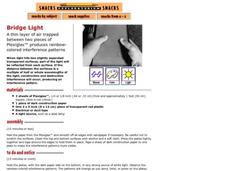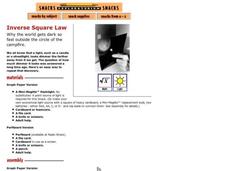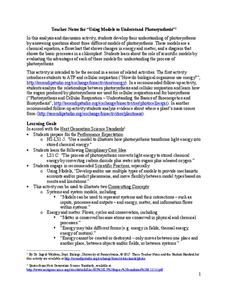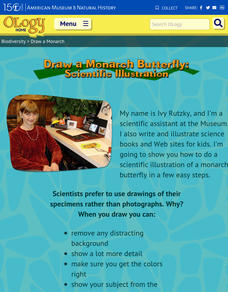Exploratorium
Bridge Light
An illuminating activity demonstrates how interference of light waves creates a pattern. Using Plexiglas™ and construction paper, participants see rainbows appear as they twist or press against the plastic plates. After the activity, you...
G. Turrell
Science Activity 1: Light & Sound
Are you looking for lab sheets to go with your class experiment on plant response to light? You are no longer in the dark! This is a lesson that was written for a unit on light, but could easily be used to demonstrate plant behaviors in...
International Technology Education Association
Singin' the Black and Blues
How does the color of the sky change from blue to reds and oranges to black? An illuminating lesson explains how light travels through different mediums using the sun's light as an example. By examining diagrams and illustrations, pupils...
Exploratorium
Inverse Square Law
The inverse square law is revealed when your class participates in this activity. They move a graph paper or perfboard square back and forth in a square of light to see how the intensity changes. You will definitely want to add this...
Exploratorium
Diffraction
Kindle knowledge of how light travels by using this activity in your physical science curriculum. By setting up a candle flame or flashlight bulb and viewing it through a slit, observers of light see evidence of its wave characteristic....
California Academy of Science
Kinesthetic Astronomy: Longer Days, Shorter Nights
A lamp, four globes, and some signs taped around the room are all you need to set up a solar system simulation for teaching how Earth's tilted axis creates the seasons. (Sticky dots are also needed, but not mentioned in the materials...
International Technology Education Association
Make a Pinhole Camera
With a little light and a lot of time, you can create some amazing images. This NASA-related task instructs pupils to build a pinhole camera. The lesson provides suggestions for different pictures to try with the pinhole camera...
Howard Hughes Medical Institute
The Making of the Fittest: Natural Selection and Adaptation
The pocket mouse can be light brown like the sands of the desert, or dark brown like the volcanic lava flows that are interspersed throughout New Mexico's Valley of Fire. It seems that predators have weeded out light colored mice in this...
Exploratorium
Give and Take
Heat-sensitive liquid crystal sheets are available in a variety of sizes and temperature ranges. Purchase a class set of hand-held sheets and color half of each with a silver permanent marking pen. Learners of light can hold them under a...
Community Consolidated Schools District 168
Solar System Model Project
Challenge young astronomers to demonstrate their knowledge of the solar system with this fun open-ended science project. Provided with a short list of requirements, students are given the freedom to use their creativity and whatever...
Serendip
Using Models to Understand Photosynthesis
Is your class in the dark about photosynthesis? Shed some sunlight on an important biological process with a thoughtful activity. After answering questions to help determine their level of knowledge, learners work with chemical equations...
Howard Hughes Medical Institute
Understanding Variation
Does where we live influence how our bodies express genetic traits? Explore variation in human skin color with an activity that incorporate video and hands-on learning. Individuals model the relationship between phenotypes and genotypes,...
101 Questions
Double Sunglasses
If you wear two sets of sunglasses, do you get twice the darkness? Pupils explore an enlightening topic using a video and math model. They discover how to extend the topic through a sequel video and challenge question.
Howard Hughes Medical Institute
Zebrafish and Skin Color
You may not know if that zebrafish in your fish tank is a model citizen—but it is definitely a model organism! What can we learn about ourselves from a tiny zebrafish? Discover more about the polygenic trait of skin color through a...
Star Date
Solar System Scale Model Demonstration
Explore outer space and decorate your classroom with an astronomy project. Learners create a visual model with the creation of a scaled solar system using different sized balls.
NASA
Measuring Solar Energy During an Eclipse
Don't leave your classes in the dark! An inquiry-based lesson has young researchers analyze the light intensity before, during, and after a solar eclipse. They use their data to make inferences about the solar energy available during...
Exploratorium
Moire Patterns
By overlapping combs and window screening and by looking at a printed set of consecutively larger circles, learners observe Moire patterns, which provide a visual of what happens during wave interference.
American Museum of Natural History
Draw a Monarch Butterfly: Scientific Illustrations
One doesn't have to be an artist to appreciate nature. A thorough resource shows pupils how to create detailed illustrations of a monarch butterfly. The lesson highlights the benefits of creating scientific drawings as opposed to simply...
Serendip
Photosynthesis and Cellular Respiration
How does energy from the sun make plants grow? Scholars move step by step through the processes that promote plant propagation during a detailed lesson. The resource illustrates ADP production and hydrolysis, then allows learners to...
It's About Time
Volcanic History of Your Community
Did you know there are 20 volcanoes erupting at any given time? Pupils look at various igneous rocks, read local geologic maps, and determine if their area has a history of volcanic activity. A reading passage and analysis questions...
Curated OER
Energy from the sun
Students put two thermometers outside on dark and light colored paper and predict which will get the hottest. In this thermometer lesson, students predict and record their results of the hottest thermometer.
American Museum of Natural History
Moon Flip Book
Flip over the phases of the moon. Using an interactive, pupils view the location of the moon relative to the sun and earth for the eight major phases of the moon. Individuals record how the moon looks through a complete cycle. Using...
University of Texas
Observing the Moon
Why does it look like there is a man on the moon? Why does the moon look different every night? These are the focus questions of a lesson that prompts class members to observe and record the nightly changes of Earth's natural...
International Technology Education Association
Reinventing Time
Take a trip through time. A lesson resource provides instruction on the origin of current measurements for time. The text explains the different tools humans used throughout history to measure time as well as provides examples such as...























